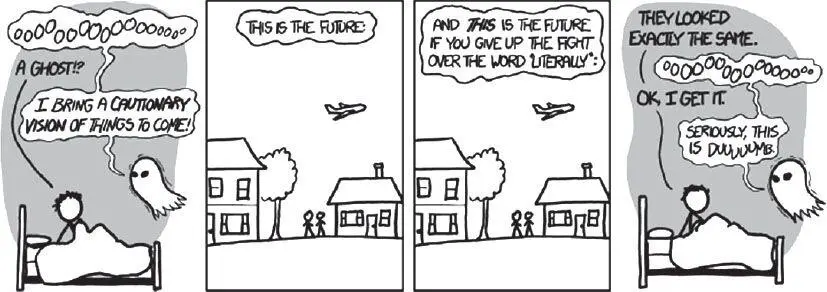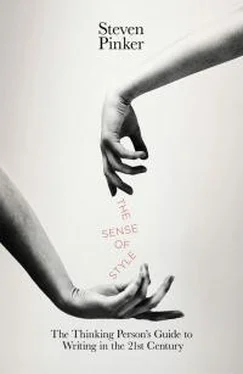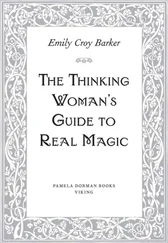Though correct usage is well worth pursuing, we have to keep it in perspective. Not even the most irksome errors are portents of the death of the language, to say nothing of civilization, as the webcomic XKCD reminds us:

Yes, writers today sometimes make unfortunate choices. But so did the writers of yesterday and the day before, while many of the kids today, the target of so much purist bile, write gorgeous prose, comment incisively on usage, and even develop their own forms of purism (such as the Typo Eradication Advancement League, which stealthily corrects grocers’ signs with correction fluid and felt markers). 72
And for all the vitriol brought out by matters of correct usage, they are the smallest part of good writing. They pale in importance behind coherence, classic style, and overcoming the curse of knowledge, to say nothing of standards of intellectual conscientiousness. If you really want to improve the quality of your writing, or if you want to thunder about sins in the writing of others, the principles you should worry about the most are not the ones that govern fused participles and possessive antecedents but the ones that govern critical thinking and factual diligence. Here are a few which are commonly flouted—not least in purist rants—and which are worth bearing in mind every time you put pen to paper or fingers to keyboard.
First, look things up. Humans are cursed with the deadly combination of a highly fallible memory and an overconfidence in how much they know. 73Our social networks, traditional and electronic, multiply the errors, so that much of our conventional wisdom consists of friend-of-a-friend legends and factoids that are too good to be true. As Mark Twain said, “The trouble with the world is not that people know too little, but that they know so many things that aren’t so.” Actually, he didn’t say that—I looked it up. 74But whoever said it (probably Josh Billings) made an important point. We are blessed to live in an age in which no subject has gone unresearched by scholars, scientists, and journalists. The fruits of their research are available within seconds to anyone with a laptop or smartphone, and within minutes to anyone who can get to a library. Why not take advantage of these blessings and try to restrict the things you know (or at least the things you write) to things that are true?
Second, be sure your arguments are sound. If you are making a factual claim, it should be verifiable in an edited source—one that has been vetted by disinterested gatekeepers such as editors, fact-checkers, or peer reviewers. If you’re making an argument, it should proceed from premises that reasonable people already agree upon to your newer or more contentious assertion using valid if-then steps. If you’re making a moral argument—a claim about what people ought to do—you should show how doing it would satisfy a principle or increase a good that reasonable people already accept.
Third, don’t confuse an anecdote or a personal experience with the state of the world. Just because something happened to you, or you read about it in the paper or on the Internet this morning, it doesn’t mean it is a trend. In a world of seven billion people, just about anything will happen to someone somewhere, and it’s the highly unusual events that will be selected for the news or passed along to friends. An event is a significant phenomenon only if it happens some appreciable number of times relative to the opportunities for it to occur, and it is a trend only if that proportion has been shown to change over time.
Fourth, beware of false dichotomies. Though it’s fun to reduce a complex issue to a war between two slogans, two camps, or two schools of thought, it is rarely a path to understanding. Few good ideas can be insightfully captured in a single word ending with - ism, and most of our ideas are so crude that we can make more progress by analyzing and refining them than by pitting them against each other in a winner-take-all contest.
Finally, arguments should be based on reasons, not people. Saying that someone you disagree with is motivated by money, fame, politics, or laziness, or slinging around insults like simplistic, naïve, or vulgar, does not prove that the things the person is saying are false. Nor is the point of disagreement or criticism to show that you are smarter or nobler than your target. Psychologists have shown that in any dispute both sides are convinced that they themselves are reasonable and upright and that their opposite numbers are mulish and dishonest. 75They can’t all be right, at least not all the time. Keep in mind a bit of wisdom from the linguist Ann Farmer: “It isn’t about being right. It’s about getting it right.”
All of these principles lead us back to why we should care about style in the first place. There is no dichotomy between describing how people use language and prescribing how they might use it more effectively. We can share our advice on how to write well without treating the people in need of it with contempt. We can try to remedy shortcomings in writing without bemoaning the degeneration of the language. And we can remind ourselves of the reasons to strive for good style: to enhance the spread of ideas, to exemplify attention to detail, and to add to the beauty of the world.
Notes
PROLOGUE
1. From the introduction to The Elements of Style (Strunk & White, 1999), p. xv.
2. Pullum, 2009, 2010; J. Freeman, “Clever horses: Unhelpful advice from ‘The Elements of Style,’” Boston Globe, April 12, 2009.
3. Williams, 1981; Pullum, 2013.
4. Eibach & Libby, 2009.
5. The examples are from Daniels, 1983.
6. Lloyd-Jones, 1976, cited in Daniels, 1983.
7. See Garvey, 2009, for a discussion of criticisms that have been leveled at Strunk & White for its insistence on plain style, and Lanham, 2007, for a critique of the one-dimensional approach to style which runs through what he calls The Books.
8. Herring, 2007; Connors & Lunsford, 1988; Lunsford & Lunsford, 2008; Lunsford, 2013; Thurlow, 2006.
9. Adams & Hunt, 2013; Cabinet Office Behavioural Insights Team, 2012; Sunstein, 2013.
10. Schriver, 2012. For more on plain language laws, see the Center for Plain Language (http://centerforplainlanguage.org) and the organizations called Plain (http://www.plainlanguage.gov) and Clarity (http://www.clarity-international.net).
11. K. Wiens, “I won’t hire people who use poor grammar. Here’s why,” Harvard Business Review Blog Network, July 20, 2012, http://blogs.hbr.org/cs/2012/07/i_wont_hire_people_who_use_poo.html.
12. http://blog.okcupid.com/index.php/online-dating-advice-exactly-what-to-say-in-a-first-message/. The quotation is from the writer Twist Phelan in “Apostrophe now: Bad grammar and the people who hate it,” BBC News Magazine, May 13, 2013.
CHAPTER 1: GOOD WRITING
1. From “A few maxims for the instruction of the over-educated,” first published anonymously in Saturday Review, Nov. 17, 1894.
2. Though commonly attributed to William Faulkner, the quotation comes from the English professor Sir Arthur Quiller-Couch in his 1916 lectures On the art of writing.
3. R. Dawkins, Unweaving the rainbow: Science, delusion and the appetite for wonder (Boston: Houghton Mifflin, 1998), p. 1.
4. According to the Google ngram viewer: http://ngrams.googlelabs.com.
5. R. N. Goldstein, Betraying Spinoza: The renegade Jew who gave us modernity (New York: Nextbook/Schocken, 2006), pp. 124–125.
6. Kosslyn, Thompson, & Ganis, 2006; H. Miller, 2004–2005; Sadoski, 1998; Shepard, 1978.
Читать дальше













